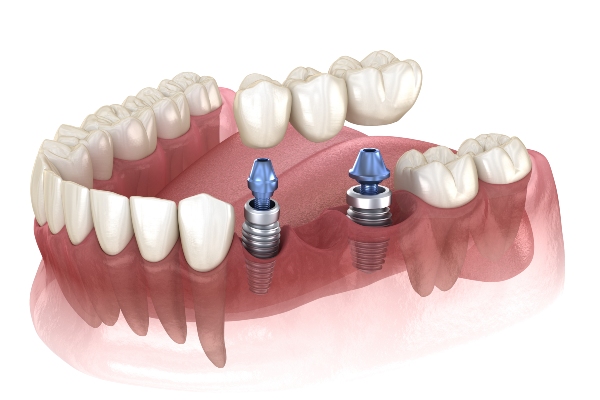Do All-on-4 Implants Have Any Side Effects?

If you’ve lost a lot of teeth and thought about getting dental implants, then you may have heard about All-on-4® implants. Like most things, though, you may be concerned that there are issues with side effects. After all, dental implants require oral surgery and putting prosthetics into your mouth, so it’s important to know whether there is potential for any side effects after getting the procedure done.
We know how scary it can be to undergo oral surgery, and that’s why in this post, we’re going to discuss the potential for side effects with these implants and the process of undergoing oral surgery. We’ll talk about the potential for side effects from the implants themselves and those associated with the process so that patients know what risks there are when opting for dental implants as a solution to tooth loss.
Do the implants cause side effects?
For patients worried about the implants themselves, you’ll be happy to know that there are no side effects to the implant itself. Like with any prosthesis, there is the potential for an allergic reaction to the materials used, but these risks are incredibly rare, and the side effects from such a reaction would be minimal.
All materials used are high-quality dental and medical-grade components that are safe for use on humans, so you’ll never have to worry about harmful effects from your new teeth once they are installed.
What are the side effects of the surgery?
There are always some side effects from having oral surgery, but they should be minimal and go away within a few days with the proper care. To help understand some of the potential side effects, we will break them down into categories to detail what to expect before, during, and after the procedure and how to mitigate any reactions to the surgery.
Pre-surgery
Before the surgery, there is no special prep or procedures that need to be done. The dentist will examine you to make sure you are a good candidate for All-on-4 dental implants and identify any potential existing or underlying oral health issues that may cause complications with the installation of the implants.
Once a patient is given a clean bill of health, they can move on to the actual installation. If teeth need to be removed before installing the implants, the dentist will wait roughly three months before installing the implants to allow for healing.
During surgery
There are no known side effects from the surgery itself. The patient will be put under for the procedure, and in very rare cases, patients have allergic reactions to anesthesia. This should be addressed by the dentist and the anesthesiologist during the pre-surgery preparation, however, so there should be no concern for potential side effects from the surgery itself.
Post-surgery
Post-surgery is when you will experience the side effects of the implant installation. The side effects are minimal and typical of any oral surgery in most cases.
You should expect mild side effects for a few days to a few weeks after the surgery. First, depending on the type of anesthesia used, you may experience grogginess for up to one whole day after the surgery.
Once sedation wears off, it is normal to experience some bleeding at the implant installation site. The bleeding should be managed by inserting gauze, and the gauze should be changed every few hours. You will likely experience some pain and discomfort around the affected area with the bleeding. This, too, is normal and should only last a few days.
Lastly, you will also experience tenderness, bruising, and swelling around the surgery area. This should be managed with pain medication prescribed by your dentist and should stop after a few days.
Contact your dentist today
Now that you know there are very few side effects from having All-on-4 implants installed to replace your missing teeth, the time is now to talk with your dentist and see if you are a candidate for this permanent full mouth tooth restoration procedure. Suppose you are a candidate for this procedure; you can expect to have an entire mouth of teeth restored in less than a year, sometimes in as little as three months.
With these implants, you’ll be able to smile confidently again and go back to enjoying the foods you love without ever worrying about your teeth again. Talk to your dentist today to learn more about what this product can offer you and your smile.
Request an appointment here: https://www.summitfamilycosmetic.com or call Summit Family & Cosmetic Dentistry at (908) 516-3833 for an appointment in our Summit office.
Check out what others are saying about our dental services on Yelp: All-on-4 Dental Implants in Summit, NJ.
Related Posts
Dental implants are the most stable dental restorations you can get. The invasive procedure will cut through your gum tissue. The dentist will drill into the jawbone and place titanium rods into the holes. The right kind of care is important to make sure that the implant site is free from infections. Here are the…
Dental implants are effective, long-lasting artificial teeth. Implants are surgically attached to the jawbone to look and function like natural teeth. As a result, patients can chew, talk, and laugh without worrying about dentures slipping. They also improve oral health. This article explores when and why to get implants and the qualifying factors for treatment.Patients…
Many types of dental implants are available. There are also many ways to attach them to your jawbone and gums. Working with your dentist can determine the right implants. Here are the different types of dental implants that are right for your dental needs.These restorations have titanium rods that the dentist inserts into the jawbone.…
You may not be aware that you need dental implants. But your dentist can tell you that you do, especially if you have regular checkups. Knowing if you need these restorations can motivate you to see your dentist about getting these dental replacements. Here are the three signs that you may need dental implants.Tooth loss…


